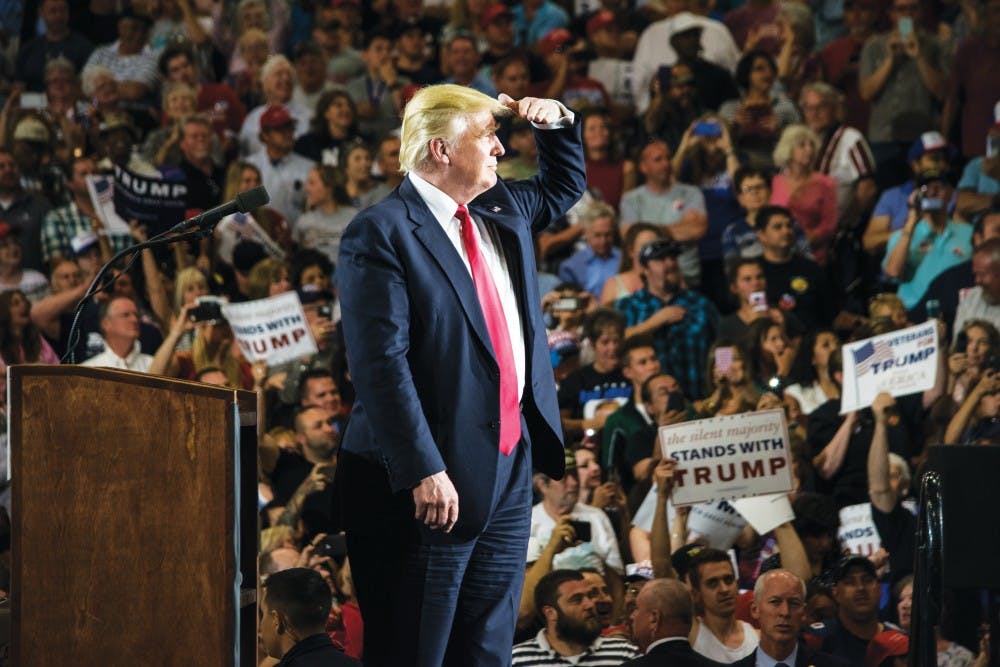The Trump administration’s first 100 days have been chock-full of successes, controversies and failures alike. The president is recording low approval ratings — 42 percent according to an aggregate calculated by FiveThirtyEight — and has begun moderating his stance on key issues.
Here’s a rundown of some Trump’s moves on big issues, shifts in his position since the campaign and how he compares to other presidents.
Foreign Policy
Trump campaigned on a self-titled “America first” platform, saying in his inauguration speech from that day onward, “it’s going to be only America first.”
Despite the promise, Trump’s position on foreign policies in regions like Syria and China have changed some since the campaign.
The U.S. attack on a Syrian airbase on April 6, 2017 marked the largest military action taken in his first 100 days. While the president was criticized for contradicting his previous stance on Syrian intervention, some UNM students feel the move was justified.
Ryan Ansloan, the former president of UNM College Republicans, felt Trump “had a moral obligation to send a message to Syria,” despite campaign promises not to intervene. Ansloan emphasized that there hasn’t been troop deployment in Syria.
Trump has also backtracked from campaign positions on China.
“I’m going to instruct my treasury secretary to label China a currency manipulator, which should have been done years ago,” Trump said in a June 2016 speech. This promise was also part of his “contract with America,” which he signed before being elected.
He wrote in a 2015 Wall Street Journal op-ed that he would make the move on his first day in office.
Instead, Trump’s position on China has shifted dramatically. The President had kind words for Chinese leader Xi Jinping in an interview with Reuters last week, calling his Chinese counterpart “a very good man.”
“I believe he is trying very hard. He certainly doesn’t want to see turmoil and death,” Trump said. “I got to know him very well.”
Get content from The Daily Lobo delivered to your inbox
In a Tweet, Trump asked why he would label China a currency manipulator, since the country was going to help the U.S. deal with North Korea.
Trump also spoke of potential conflicts with North Korea amid heightening tensions.
“There is a chance that we could end up having a major, major conflict with North Korea. Absolutely,” the President said.
Trump has pushed for diplomatic options against Pyongyang, urging the U.N. Security Council ambassadors to “impose additional and stronger sanctions” on the country.
Domestic Policy
In what many have labeled as a defeat for the Trump administration, the push to repeal the Affordable Care Act ended in dramatic form earlier this year.
The proposed replacement bill — the American Health Care Act — was withdrawn in late March when it became clear the Republican-championed legislation didn’t have enough support in the House of Representatives.
Days before the House vote, several reports were made that Trump team leadership threatened lawmakers by saying they would be “stuck with Obamacare.”
Molly Thomas, a freshman who supported Clinton in the election, didn’t like the administration’s healthcare push.
“Posing an ultimatum was a cop-out from actually having to work to fulfill his campaign promises,” Thomas said.
She also didn’t like Trump’s early executive orders which targeted travelers from several predominantly Muslim countries.
Thomas said the order “was especially scary, because it displayed his administration’s complete misunderstanding of an entire segment of America.”
“Islam has been directly attacked by his administration,” she said.
Many portions of the President’s orders have been blocked in court, including those that targeted so-called sanctuary cities.
But blocks by the judiciary haven’t slowed other efforts to reform U.S. immigration.
On the campaign trail, Trump promised heightened enforcement of immigration law on the U.S.-Mexico border. Recent data from the United States Border Patrol show that arrests on the border are at a 17-year low — something some attribute to Trump’s tough immigration rhetoric.
Nearly a 20 percent decrease in international graduate applicants was recently reported by the UNM Global Education office. UNM’s troubles reflect a national trend. Nearly 40 percent of colleges and universities have reported a similar decline, according to a survey conducted by the American Association of Collegiate Registrars and Admissions Officers.
One definite win for the Trump administration has been the confirmation of Neil Gorsuch to the U.S. Supreme Court. The conservative Justice is 49, making him the youngest on the Court. The appointment has been called a critical step in maintaining a conservative majority and bolstering the Trump legacy.
Economy
Despite president Trump’s efforts to strengthen the economy, reports show economic expansion has slowed in the administration’s first months.
The Commerce Department said the nation’s GDP expanded at a 0.7 percent annual rate in the first three months of the year. The growth is the slowest since 2014 and was a sharp drop from the last year’s final quarter growth of 2.1 percent.
The trend of slow first quarter growth is nothing new and may not be an accurate reflection of the economy’s strength, said Ian Shepherdson of Pantheon Macroeconomics in an interview with Politico.
Pantheon Macroeconomics is a research firm who publishes nationwide economic trends.
Those low figures are contrasted by a high consumer confidence index rating and a climbing stock market.
Ansloan feels the administration’s policies have been “pro-growth.”
“We’re seeing implementation of a pro-growth agenda, and I think we’re going to keep seeing it,” he said, mentioning re-negotiations of trade agreements, a newly unveiled tax plan, and a continual strengthening of consumer confidence figures.
Following campaign promises, Trump withdrew the U.S. from the Trans-Pacific Partnership and, recently, has begun to renegotiate terms in the North American Free Trade Agreement, although he had previously promised to get the U.S. out of NAFTA entirely.
Trump also followed through on his promises to simplify the tax code. His plan proposed to reduce the number of tax brackets from the current seven to three, repeal the Alternative Minimum Tax and eliminate the Estate Tax.
Gary Cohn, Trump’s chief economic advisor, also outlined breaks on capital gains, lower tax rates for married couples, and the elimination of certain benefits for high-income earners.
How does Trump compare?
Since the campaign, the president’s positions seem to have shifted on everything from trade to foreign policy.
According to political science professor Michael Rocca, that should come as no surprise.
“It seems to me he’s a different type of president than we saw in the campaign,” he said. “That’s nothing new.”
Rocca said access to specialized information changes a president’s perspective. That’s why “campaign Trump is different than governing Trump.”
There have been many indications of Trump becoming a more typical president, Rocca said, citing military action in Syria, engagement with North Korea, and shifting power away from controversial White House figures like political advisor Steve Bannon.
Despite the policy shift, Rocca isn’t yet ready to judge the president.
“I wouldn’t judge his first 100 days as a success or disaster,” he said, adding the next three years are going to be even more tough for the president.
“This was Trump’s best chance to get anything big through Congress,” he said. “This was the time people were willing to give the President the benefit of the doubt.”
He noted that presidents, Trump included, often “fall victim” to their sometimes lofty campaign promises and can’t get through what they promised.
“To successfully govern, you have to be relatively moderate,” Rocca said.
Brendon Gray is a news reporter for the Daily Lobo. He can be reached at news@dailylobo.com or on Twitter @notgraybrendon.






